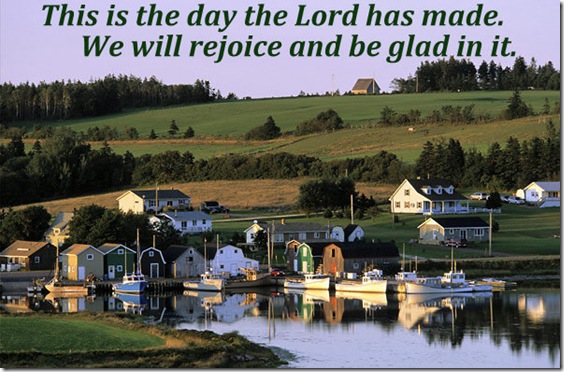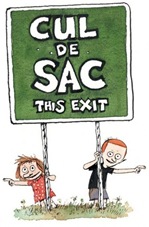Do you remember when the law was changed that allowed Walmart, Superstore and my bike repair shop to start opening up on Sundays? In Ontario in the early 1990s, I can remember being invited to church-sponsored rallies to demonstrate against Sunday openings of our grocery stores. Many churches were very concerned about shopping on Sundays and the secularization of our society. It was actually on April 24, 1985 that the Supreme Court of Canada ruled that “the Lord's Day Act violated Canadians' freedom of religion… This law—the Lord's Day Act—prevented non-Christians from performing otherwise legal activities on Sundays” (“Sunday Shopping,” Wikipedia). The court found this to be inconsistent with the then-new Canadian Charter of Rights and Freedoms. Over several years this has played out in the provinces of Canada, each in some way moving toward removing restrictions from Sundays. This week, I was surprised to discover that it’s still playing out in Canada’s smallest (and in some ways, most traditional) province, Prince Edward Island.
 Regis and Kelly made PEI famous this summer by hosting their show, live from the island for four days. On the first day in PEI, July 12, Live with Regis and Kelly scored its most-watched in Canada episode ever! Almost one million viewers watched Regis Philbin and Kelly Ripa being marched onto stage by the Royal Canadian Mounted Police at Confederation Landing Park in Charlottetown, Prince Edward Island. Very cool! Now, when Regis and Kelly were there on Sunday, July 11 before taping, most stores and shops were open to tourists! Yes, stores open on Sunday! So what’s being debated in the PEI Legislature now? Here’s the deal. Prince Edward Island had previously partially removed restrictions on Sunday shopping, a kind of compromise position. Stores were permitted to open after 12 noon from the Sunday before Victoria Day (late May) until Christmas Eve, but for the other 5 months of the year they were to be closed.
Regis and Kelly made PEI famous this summer by hosting their show, live from the island for four days. On the first day in PEI, July 12, Live with Regis and Kelly scored its most-watched in Canada episode ever! Almost one million viewers watched Regis Philbin and Kelly Ripa being marched onto stage by the Royal Canadian Mounted Police at Confederation Landing Park in Charlottetown, Prince Edward Island. Very cool! Now, when Regis and Kelly were there on Sunday, July 11 before taping, most stores and shops were open to tourists! Yes, stores open on Sunday! So what’s being debated in the PEI Legislature now? Here’s the deal. Prince Edward Island had previously partially removed restrictions on Sunday shopping, a kind of compromise position. Stores were permitted to open after 12 noon from the Sunday before Victoria Day (late May) until Christmas Eve, but for the other 5 months of the year they were to be closed.
 On Tuesday this week, Olive Crane, the Leader of the Conservative Opposition in the PEI Legislature, introduced a bill to remove the remaining restrictions, giving businesses the power to decide for themselves what to do on Sundays. As you watch this news video, perhaps you can join me in remembering when this issue mattered so much that we were involved in the debate…
On Tuesday this week, Olive Crane, the Leader of the Conservative Opposition in the PEI Legislature, introduced a bill to remove the remaining restrictions, giving businesses the power to decide for themselves what to do on Sundays. As you watch this news video, perhaps you can join me in remembering when this issue mattered so much that we were involved in the debate…
“I can’t open the Bible and say, ‘Thou shalt not shop on Sunday.’”
The pastor in the news report is correct. There is no Scriptural support for Christians to oppose shopping on Sundays. Back in the 1980s and 90s, it seems to me that we in the church were opposed to it because we viewed Sunday as “the Lord’s Day” and many understood that to mean that it was a day of rest, essentially the Old Testament Sabbath moved from the seventh day, Saturday, to the day of post-resurrection worship of Christ, the first day, Sunday. This is not what the Bible teaches about the Sabbath. I see no indication in the New Testament that the Sabbath practices of the OT were to be transferred from Saturday to Sunday. But at that time in the 1990s, we feared that the church was losing its place in society, that secularization was happening rapidly and Ontario was about to leave behind its Christian heritage. In retrospect, I think we were misguided because Sunday is not the Sabbath nor does the NT ever describe it as a day of rest.
It is clear that Christians were gathered together on the day of the resurrection of Jesus—Sunday. And it’s also clear from the New Testament, that Christians continued to gather every Sunday after that day (John 20:19, 26). On the Day of Pentecost (seven Sundays later), while they were gathered together the Holy Spirit was given and the church was born (Acts 2:1-4). Did you know that Christians actually renamed the first day of the week? They started calling it “The Lord’s Own Day” (κυριακῇ ἡμέρᾳ / Kuriake h’amera) or simply “The Lord’s Own.” This new name for the first day occurs just one time in the New Testament, Revelation 1:10, but it is used frequently in early Christian writings. So, for example, around AD 100, Ignatius wrote an Epistle to the Magnesians, saying “We have seen how former adherents of the ancient customs have since attained to a new hope; so that they have given up keeping the Sabbath, and now order their lives by the Lord’s Own Day instead” (9:1). And to present day, Christians continue to gather together on Sundays to worship our Risen Lord. Now, historically, some churches adopted Sabbath-like regulations for this day, making it a day of rest, but this was not biblically-mandated. Indeed, Romans 14:5-6a claims that there is freedom to make these kinds of choices on a personal level, “Some consider one day more sacred than another; others consider every day alike. Everyone should be fully convinced in their own mind. Those who regard one day as special do so to the Lord.” But when it comes down to arguments about Saturday vs. Sunday and such, Colossians 2:16-17 takes the matter further, saying, “Therefore do not let anyone judge you by what you eat or drink, or with regard to a religious festival, a New Moon celebration or a Sabbath day. These are a shadow of the things that were to come; the reality, however, is found in Christ.”
Everyone should be fully convinced in their own mind. Those who regard one day as special do so to the Lord.” But when it comes down to arguments about Saturday vs. Sunday and such, Colossians 2:16-17 takes the matter further, saying, “Therefore do not let anyone judge you by what you eat or drink, or with regard to a religious festival, a New Moon celebration or a Sabbath day. These are a shadow of the things that were to come; the reality, however, is found in Christ.”
This “reality found in Christ” is not the OT Sabbath being moved from one day to another. No way! By biblical definition, the Sabbath is the seventh day—Saturday, a day of rest under the law of Moses. But as with the Passover, Pentecost and other special holy days of the old covenant, the Sabbath was a type or “a shadow of the things that were to come,” something which would find greater fulfillment in the new covenant. What was the OT Sabbath pointing toward? The writer of Hebrews explores this greater fulfillment, explaining that the Sabbath pointed toward the rest of God, and now, in Jesus, we are invited to that rest. “There remains, then, a Sabbath-rest for the people of God; for those who enter God’s rest also rest from their own work, just as God did from his. Let us, therefore make every effort to enter that rest…” (Hebrews 4:9-11a). We enter it not once per week, but as a new way of living in time. Our experience of Christ changes all of our days. All of our time in Christ is to be lived differently now. The very way that we experience time is now being transformed, so that we are people who live more for the moment than for the minute. Sunday worship helps to ground me and remind me who I worship and connect me with my brothers and sisters in Christ, but every day now is sacred time to be lived doing the will of Christ.
 One day a week is simpler, but Christ calls us to enter into his rest, 24/7. Jesus invites us to follow him into a whole new lifestyle. How will I live each and every day to his glory? How do I move from praying "Thy will be done" in the Lord's Prayer to actually doing it? Prince Edward Island Christians will now face this same challenge of not allowing the daily rat race of so invading every minute of our lives that we forget who we are and and whom we follow. Eugene Peterson shows a great understanding of Romans 12:2 in The Message, when he paraphrases, “Don't become so well-adjusted to your culture that you fit into it without even thinking. Instead, fix your attention on God. You'll be changed from the inside out. Readily recognize what he wants from you, and quickly respond to it. Unlike the culture around you, always dragging you down to its level of immaturity, God brings the best out of you, develops well-formed maturity in you.” Many Islanders will still have Sunday off, a day set apart to be reminded of who we are in Christ and where he's leading us in life. But with or without that day off, faithfulness to Christ means learning to live all of our time in Christ, in his rest. So the passing of this bill cannot destroy our faith, unless we allow it to.
One day a week is simpler, but Christ calls us to enter into his rest, 24/7. Jesus invites us to follow him into a whole new lifestyle. How will I live each and every day to his glory? How do I move from praying "Thy will be done" in the Lord's Prayer to actually doing it? Prince Edward Island Christians will now face this same challenge of not allowing the daily rat race of so invading every minute of our lives that we forget who we are and and whom we follow. Eugene Peterson shows a great understanding of Romans 12:2 in The Message, when he paraphrases, “Don't become so well-adjusted to your culture that you fit into it without even thinking. Instead, fix your attention on God. You'll be changed from the inside out. Readily recognize what he wants from you, and quickly respond to it. Unlike the culture around you, always dragging you down to its level of immaturity, God brings the best out of you, develops well-formed maturity in you.” Many Islanders will still have Sunday off, a day set apart to be reminded of who we are in Christ and where he's leading us in life. But with or without that day off, faithfulness to Christ means learning to live all of our time in Christ, in his rest. So the passing of this bill cannot destroy our faith, unless we allow it to.
PEI has caught up with Nova Scotia, the other Canadian provinces and the 1985 ruling of the Supreme Court of Canada. We may really like the idea of everything shutting down for one day of the week—I know I do, but there is no specifically Christian or theological basis for mandating this. Even if there were, on what basis would we impose our Christian practice on all of society, our multicultural society? What will really make a difference in our society is not Christians imposing a weekly day off on society, but Christians living for Christ 24/7 , seeking him daily and daily attempting to do his will and live as Jesus himself would live. Prince Edward Island will not suddenly slide into decadence because businesses can now choose to be open on Sundays. Look what Regis and Kelly did for the island this summer—people are still talking about it! Imagine what the Christians of PEI could do if together they started living out their faith not just on Sunday or Saturday, but every day of every week. Prince Edward Island could be renewed, a place where Christ could be found in Canada: Parva sub ingenti (“the small under the protection of the Great”).
, seeking him daily and daily attempting to do his will and live as Jesus himself would live. Prince Edward Island will not suddenly slide into decadence because businesses can now choose to be open on Sundays. Look what Regis and Kelly did for the island this summer—people are still talking about it! Imagine what the Christians of PEI could do if together they started living out their faith not just on Sunday or Saturday, but every day of every week. Prince Edward Island could be renewed, a place where Christ could be found in Canada: Parva sub ingenti (“the small under the protection of the Great”).
 NOTE: Originally this post also included interaction with Seventh-Day Adventist beliefs about the Sabbath, Sunday and the Sunday law. This interaction has been moved to a better place in the Comments section where it will actually allow for discussion and interaction. If you understand the Seventh-Day Adventism position or you are a Seventh-Day Adventist, I welcome your interaction.
NOTE: Originally this post also included interaction with Seventh-Day Adventist beliefs about the Sabbath, Sunday and the Sunday law. This interaction has been moved to a better place in the Comments section where it will actually allow for discussion and interaction. If you understand the Seventh-Day Adventism position or you are a Seventh-Day Adventist, I welcome your interaction.










